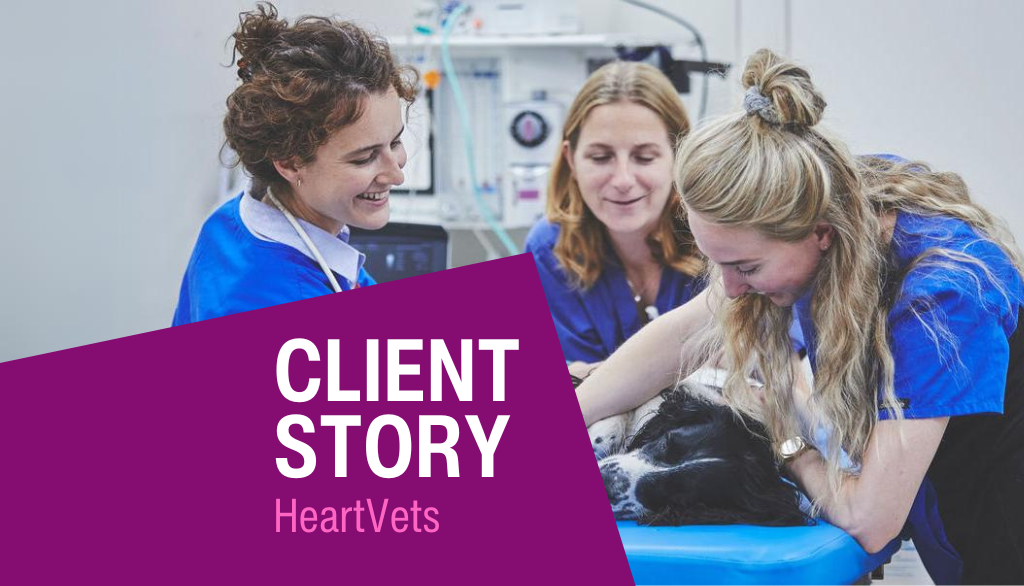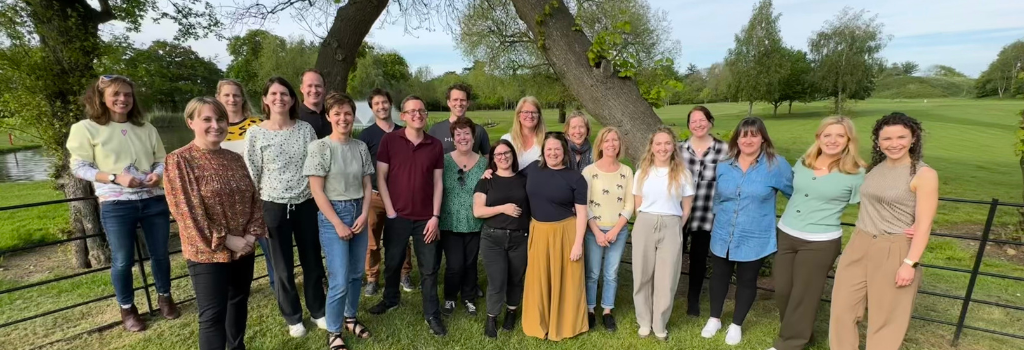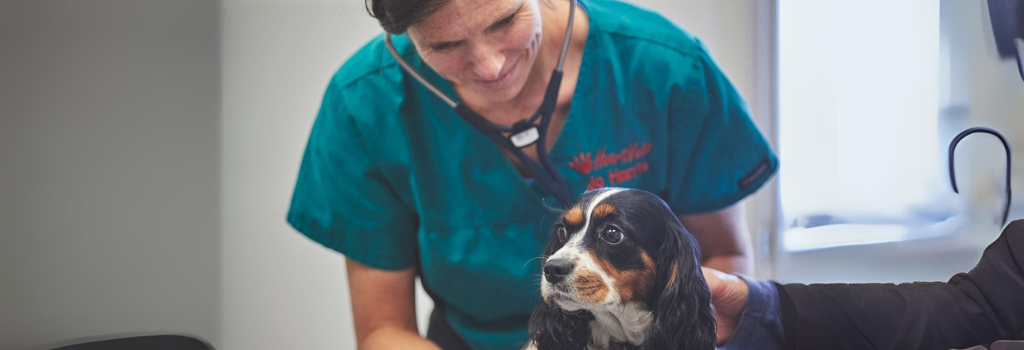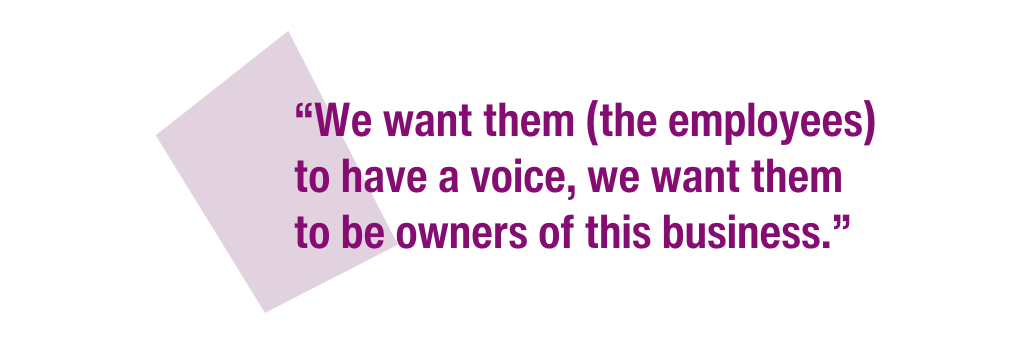
As a nation that prides itself on being animal lovers, we want the best possible care for our pets. HeartVets is the country’s largest cardiology referral practice, with its primary work taking care of dogs, cats, and horses. It recently made the decision to become Employee Owned (EO), ensuring that its future is assured, and its vital work can continue.
Building the Practice
Originally founded by Doctor Mark Patterson, a veterinary cardiology specialist, he had set up as a consultant renting out premises at Vale Referrals, where the HeartVets team still hold a regular clinic.
Working at a practice in Dorset and in the process of moving down to the South West, Jo Harris sought Mark’s services, and he suggested working together. Jo began to cover some days at his clinic, before the duo opened regional centres. They began to see referred cardiology cases, dogs, cats, horses, and the occasional smaller animal.
Jo wanted to start a telemedicine service, recognising that there was a need for vets without cardiology knowledge to get specialist help, and where pets couldn’t be referred due to the cost of travel, or for any other reason. She could assist vets by interpreting their ECG’s or x-rays and give remote advice on individual cases.
That led to an interest in Holter monitoring, where a small, digital monitor is attached to a pet with electrodes on its chest, and the device continually records the animal’s heartbeat for anything from 24 hours up to a week. At the time, it wasn’t really done in veterinary medicine, and with Jo having established the service, HeartVets has become the only veterinary specific Holter monitoring department in Europe, analysing ECG data for clients from across the continent.
At that time, Jo and Mark began working with Dave Dickson who was also seeing cases overseen by Mark as Dave worked towards his specialist qualification. Dave joined the partnership, and the company’s growth began to take off.
Expansion
That growth accelerated through Covid because of the service being provided. Many referral centres can be expensive, with a lot of providers being corporate-owned. Only a small percentage of clients can afford that level of service. The HeartVets team wanted to provide the same level of specialist care, while maintaining their place in general practices and doing peripatetic work visiting clinics to extend their reach.
Providing excellent care while positioned in the gap between general practice and the top flight referral centres, HeartVets began to attract attention for its quality of work. As referral centres and face-to-face clinics struggled during lockdown, the telemedicine side of HeartVets’ offer saw the company grow to work across a large geographic area of the South West.
Mark was based in Gloucester, Jo was in Exeter, and Dave was working from Wales. New team members came on board and were similarly split geographically. Due to restrictions in place at the time and no longer able to go into a clinic, Jo began to travel with a hired nurse and a scanner in the boot of her car, setting up in a room to carry out work.
That period also saw many independent practices being bought by corporations, with more than half coming under a corporate umbrella. It resulted in a lot of cost cutting, with fewer nurses available to help. HeartVets had to become more self-sufficient as a service, going from the three vets to requiring a team to answer the phone, arrange appointments, and employ nurses to support day to day operations.
Quickly growing from three, to ten, to 20 people, HeartVets began to run a complete offer, while still visiting other practices to carry out work. Renting a room for the day, the team will see clients from that practice, and sometimes those referred from other local vets.
The rapid growth led to concerns in the team that HeartVets would be a target for a corporate business. Other options were looked at, and it saw Jo, Mark, and Dave getting a HR and IT department, putting in place an infrastructure that had never previously been a consideration. Not wanting to lose the family feel of the business and with Mark choosing to retire, Jo and Dave bought him out and started to look at the future direction of HeartVets.

Making the Change
The focus was to reassure the team that there was no intention of selling to a corporation having worked so hard to build the company. Jo and Dave began to research what could be done, wanting to bond the clinicians in the staff and to make sure everyone felt that they had a real, vested interest in the company.
A conversation with their accountants introduced them to the EO model. Examining it further, it was a route several other veterinary practitioners had chosen, and it felt like a natural fit for HeartVets’ direction of travel.
As a practice that clients come to directly and being referred by other vets, HeartVets undertake work with clients from independent practices as well as corporate owned companies, so by selling to a corporation, it would have cut off half the market straight away.
With Jo and Dave not looking to retire and wanting to safeguard the company’s independent status, the desire to remain collaborative across the entire sector and not be aligned with a large, super company, that desire to be more sustainable saw the EO model become more appealing. The clinical and telemedicine side of the business was the element that Jo and Dave wanted to put into EO.
The work to buy out Mark’s part of the business was being handled by Giles Dunning, Partner in Stephens Scown’s Corporate team, and the idea of EO was discussed. They had asked Giles about EO and if he had any knowledge of the subject, with Giles telling them that Stephens Scown was itself an EO organisation.

Specialist Support
Giles put the duo in touch with Cat Carlton, also Partner in the Corporate team and one of the firm’s EO specialists, and with George Demirev from the Corporate team.
After a conversation with Cat and George, Jo and Dave decided to take the plunge and make HeartVets an EO company. The aim was to make the transition to coincide with the end of the business and tax year.
Jo said, “We had quite a tight timeframe because I think we were quite naïve, honestly. We didn’t really know what this was going to involve, but Cat and George managed to get everything pretty much turned around within probably four months in the end, they were both great.
“My advice to anybody else is to give yourself plenty of time to plan it, I think we didn’t because we didn’t know we needed to.”
Contact throughout was regular, with conversations taking place online or on the phone, with information shared when needed. Jo said, “Because we’re so busy with clinics, it’s hard to take that time out. So initially we had Teams meetings where they went through what to expect and Cat was helpful with that, she was very approachable. She went through everything that we needed to expect, things that we needed to do.”
It wasn’t just about Jo and Dave though, as Jo explained. “It was very useful to work through, and they also shared information that was aimed more for our team so they could see what was happening, and I think that was really helpful.”
What also helped was an EO day workshop that Stephens Scown ran, bringing together businesses from across the region who were EO, or had an interest in the concept. Jo felt the benefits of the session saying, “I enjoyed it and would like some of our other trustee directors to come to any future events. It was helpful to talk to other businesses that have done it or are considering doing it. I liked the format of the day, it was very informal, and I could see that a lot of people were having the same sort of challenges, of getting their employees to understand what it’s about and getting them on board.”
Once the EO transition was confirmed, Jo noticed the difference it made to the employees. “The vet nurses and the admin team, they have been wholeheartedly delighted. They can’t believe their luck that a business has taken this step and said that we want to reflect their input. We want them to have a voice, we want them to be owners of this business.
“They’ve almost unanimously said I never thought I would be in a position to have an input into a business.”
Since the transition, George has helped Jo and the team with the practicalities of filing necessary documentation with Companies House. Part of that also meant clearing the name HeartVets Consultancy, as the use of ‘vet’, or ‘veterinary’ in a company name are regulated and must be cleared by the Royal College of Veterinary Surgeons.
With HeartVets thriving, what plans does Jo have for the future? “We’re looking now to get our business into a more self-sustaining status and consider how we can keep working with everyone in the industry. We want to make sure we stay integrated and have a good working relationship with all the corporate and non-corporate partners within our vet world.
“We want everyone to understand that if they put their hard work into it and they all come with ideas, well we’ve always been a very forward thinking, dynamic, kind of creative environment and we want to foster that.
“We want to keep providing affordable care for everyone, and I think this is a way to get everyone engaged on that.”
One thing seems certain, under the leadership of Jo and Dave and with the backing of their employees, HeartVets’ future and innovation in the field of animal care will continue to see the company maintain its position as a leader in the veterinary sector.

